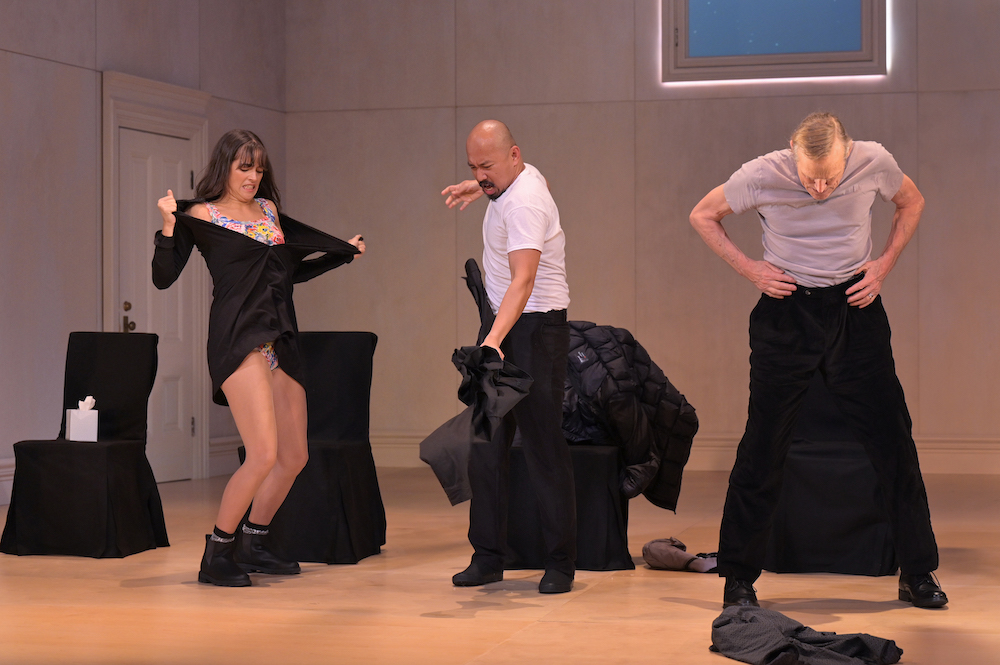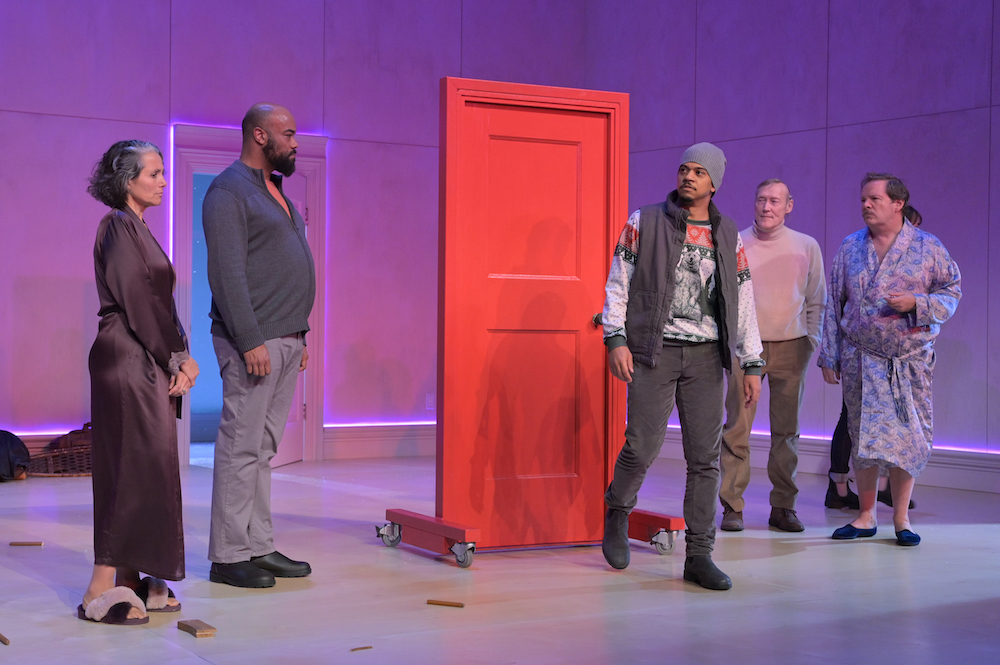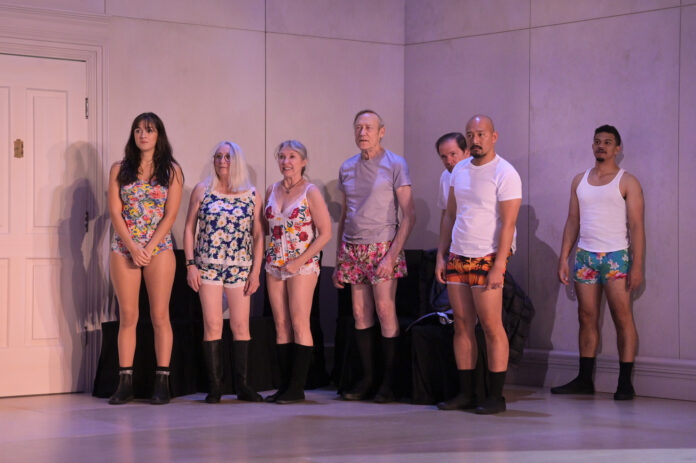It hasn’t been lost on regulars of the Berkeley Rep, one of the most prominent theaters on the West Coast, that it’s been a full 20 months since its last in-person show, Culture Clash’s (Still) in America. Nevertheless, Managing Director Susie Medak made it the focus of both her pre- and post-show curtain speeches. After nearly two years and a few streamed shows, a lot of people have missed these Roda and Peets stages.
So welcome were we that the theatre gave us all gift bags with shiny pom-poms and purple Berkeley Rep masks.
Wanting to gently ease audience back into seats, it makes sense that the Rep would do so with a fluffy farce. When you’ve spent the last year-plus avoiding crowds for you own health, you might not be in the mood for something too heavy. The problem with Charles L. Mee’s Wintertime is that it’s trying very hard to be incredibly light—while at the same time telling us that what happens to these characters is important.
The plot, such as it is (a farce doesn’t need substance), begins days before New Year’s Eve. Millennial couple Jonathan (Micah Peoples) and Ariel (Carmen Berkeley) arrive at the former’s family winter home to spend the cold days warming one another up. Their plans are stopped cold—no pun intended—when a bedroom door opens to reveal Jonathan’s mother Maria (Nora el Samahy) and her longtime lover François (Thomas Jay Ryan). Before the couples have a chance to get their bearings, they’re soon joined by Jonathan’s father—still Maria’s husband—Frank (James Carpenter) and his longtime lover Edmund (David Ryan Smith). For a brief time, they’re also joined by local couple Bertha (Lorri Holt) and Hilda (Sharon Lockwood).

As per the necessities of farce: many doors are slammed; many clothes are torn; many “uh-oh” moments occur. Unfortunately, the play (directed by frequent Mee collaborator Les Waters) seems intent on ignoring the rule to always keep things moving. In fact, there are a great many stretches where two characters go off on tangents and the rest of the characters will just stand around and watch them, as if they have nothing better to do. One minute, Ariel is so angry with Jonathan that she packs her things and is ready to leave. The next minute, she and the other characters become wallpaper on Annie Smart’s pristine alabaster set as other characters drain the air out of the room.
We’re told this is all important, and it could have been. After being in open relationships for who-knows-how-long, the elder couples have reached breaking points from which they may never recover. Mee uses a clever device in the first act, where an argument between François and Maria is mirrored almost word-for-word by Frank and Edmund. Laughs are thrown in, but they don’t so much remove tension as give one tonal whiplash.
And then there’s Jonathan and Ariel: For some inexplicable reason, Jonathan believes that Ariel—whom he wanted to marry—may have slept with François some time ago. One’s sexual history is generally their own business, but just how Jonathan makes the quantum leap from watching François be his flirtatious self to believing his mother’s side-piece banged his girlfriend is never explained. What’s more, it results in Jonathan verbally slut-shaming her with some truly unforgivable phrases; hence her wanting to leave soon after.
And all of this is played as if every twist and turn is a pure knee-slapper. The chasm between Mee and Waters’ intentions and their execution is a mile wide. When the end finally arrives, it’s expected that not all the couples will be intact, but there’s no reason for the ones who remain together to do so.

To the production’s credit, the aforementioned set by Smart continues the Rep’s, well, rep for high technical skill. The place spends most of the show barren with long strands of tinsel hanging from the ceiling, an upstage window revealing light snowfall. A clever Waters-directed segment shows the characters acting out the genre’s most famous trope by all walking through and slamming a free-standing red door; Russell Champa’s lights glow red to accentuate the moments. And though the cast—including quick appearances by Jorma Togatac as a delivery man and Sarah Nina Hayon as one of François’s actual former lovers—are given characters simultaneously hefty and lacking dimension, they try to have fun with them.
If there were one true standout, it would have to be el Samahy as Maria. Her refusals to apologize for her sexual appetites and to confront the mistakes she’s made in relationships are both well-realized by el Samahy. She finds the best tone between bombshell vixen and bad girlfriend in a way that makes the character the most human.
She’s a highlight in a production that tries to call its swing like Babe Ruth, but winds up striking out on a pretty average pitch. The technical aspects are enough to make one grateful to be back in the Roda Theatre, but the production is far from the company’s finest work.
WINTERTIME plays at the Berkeley Rep through December 19. More info here.






